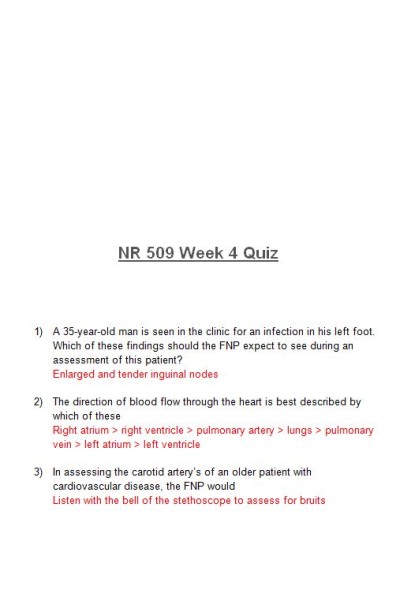1.
Question: A
35-year-old man is seen in the clinic for an infection in his left foot. Which
of these findings should the FNP expect to see during an assessment of this
patient?
2.
Question: The
direction of blood flow through the heart is best described by which of these
3.
Question: In
assessing the carotid artery’s of an older patient with cardiovascular disease,
the FNP would
4.
Question: When
listening to heart sounds the FNP knows that the valve closures that can be
heard best at the base of the heart are
5.
Question: The
sack that surrounds and protects the heart is called the
6.
Question: When
assessing a newborn infant who is five minutes old the FNP knows that which of
these statements would be true?
7.
Question: The
FNP is performing an assessment on an adult. The adults vital signs are normal
and capillary refill is five seconds. What should the FNP do next?
8.
Question: During
an assessment of an older adult the FNP should expect to notice which finding
as normal physiologic change associated with aging process?
9. Question: The
mother of a three month old infant states that her baby has not been gaining
weight. With further questioning the FNP finds that the infant falls asleep
after nursing and wakes up after a short amount of time hungry again. What other
information with the FNP want to have?
10. Question: In
assessing a patient’s major risk factors for heart disease which would the FNP
want to include when taking a history?
11. Question: The
FNP is assessing the pulses of a patient who has been admitted for untreated
hyperthyroidism. The FNP should expect to find a____pulse
12. Question: A
patient complains of leg pain that wakes him at night. He states that he has
been having problems with his legs. He has pain in his legs when they are
elevated and disappears when he dangles them. He recently noticed a sore on the
inner aspect of his right ankle. On the basis of this history information the
FNP interprets that the patient is most likely experiencing
13. Question: During
an assessment the FNP uses the profile sign to detect
14. Question: Which
of these statements describes the closure of the valves in a normal cardiac
cycle?
15. Question: When
performing a peripheral vascular assessment on a patient the FNP is unable to
palpate the ulnar pulses. The patient skin is warm and capillary refill is
normal. The FNP should next
16. Question: A
67-year-old patient states that he “recently began have pain in his left calf
when climbing the 10 stairs to his apartment”. This pain is relieved by sitting
for about two minutes then he’s able to resume activities. The FNP interprets
this patient is most likely experiencing
17. Question: In
assessing a 70-year-old man the FNP finds the following blood pressure 140/100
mmHg, heart rate 104 and slightly irregular, split S2. Which of these findings
can be explained by expected hemodynamic changes related to age?
18. Question: The
FNP is examining the lymphatic system of a healthy three year old child. Which
finding should the FNP expect?
19. Question: The
FNP is preparing to perform modified Allen test. Which is an appropriate reason
for this test?
20. Question: A
25-year-old woman is in her fifth month of pregnancy has a blood pressure of
100/70 mmHg. In reviewing her previous exam the FNP notes that her blood
pressure in her second month was 124/80 mmHg. When evaluating this change what
does the FNP know to be true?
21. Question: Findings
from an assessment of a 70-year-old patient with swelling in his ankles include
jugular venous pusations, 5 cm above the sternal angle when the head of his bed
is elevated 45°. The FNP knows that this finding indicate:
22. Question: The
component of the conduction system referred to as the pacemaker of the heart is
the
23. Question: The
FNP is reviewing anatomy and physiology of the heart. Which statement best
describes what is meant by atrial kick?
24. Question: A
45-year-old man is in the clinic for a routine physical. During history the
patient states he has been having difficulty sleeping. I’ll be sleeping great
and then I wake up and feel like I can’t catch my breath. The FNP‘s best
response to this would be
25. Question: When
assessing a patient the FNP notes that the left femoral pulse as diminished
1+/4+. What should the FNP do next?
| Instituition / Term | |
| Term | Fall 2018 |
| Institution | Chamberlain |








-80x80.JPG)











































